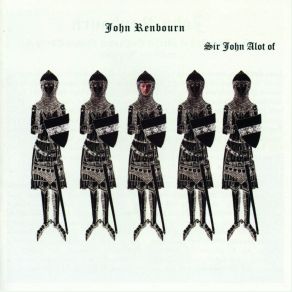Sir John Alot of Merrie Englandes Musyk Thyng & Ye Grene Knyghte
Download links and information about Sir John Alot of Merrie Englandes Musyk Thyng & Ye Grene Knyghte by John Renbourn. This album was released in 1968 and it belongs to Rock, World Music, Songwriter/Lyricist, Contemporary Folk genres. It contains 13 tracks with total duration of 36:55 minutes.

|
|
|---|---|
| Artist: | John Renbourn |
| Release date: | 1968 |
| Genre: | Rock, World Music, Songwriter/Lyricist, Contemporary Folk |
| Tracks: | 13 |
| Duration: | 36:55 |
| Buy it NOW at: | |
| Buy on iTunes $11.99 | |
| Buy on Amazon $11.49 | |
| Buy on iTunes $11.99 | |
Tracks
[Edit]| No. | Title | Length |
|---|---|---|
| 1. | The Earle of Salisbury | 1:20 |
| 2. | The Trees They Do Grow High | 3:33 |
| 3. | Lady Goes to Church | 2:51 |
| 4. | Morgana | 7:25 |
| 5. | Transfusion | 1:58 |
| 6. | Forty-Eight | 2:52 |
| 7. | My Dear Boy | 1:17 |
| 8. | White Fishes | 2:38 |
| 9. | My Sweet Potato | 3:18 |
| 10. | Seven Up | 3:46 |
| 11. | The Earle of Salisbury (Alternate Take 4) | 1:19 |
| 12. | Transfusion (Alternate Take 2) | 1:56 |
| 13. | Forty-Eight (Alternate Take 1) | 2:42 |
Details
[Edit]An instrumental album (originally called Sir John Alot of Merrie England) featuring John Renbourn with his Pentangle bandmate Terry Cox on percussion and Ray Warleigh on flute. Originally released in England in 1968, the same year that Pentangle started to record, Sir John Alot was steeped largely in English folk music. Highlights include "The Trees They Do Grow High" (aka "Long A-Growing"), solo guitar miniatures such as "Lady Goes to Church," the epic "Morgana," with its sharply nuanced tempo and timbre changes, and the sprightly "My Dear Boy." Some parts of this album are surprisingly contemporary sounding, such as the bluesy "Transformation," which sounds like "What'd I Say" transposed for acoustic guitar and African drums; "White Fishes," which veers dangerously close to quoting George Gershwin's "It Ain't Necessarily So" and Rodgers & Hammerstein's "My Favorite Things"; and "Sweet Potato," which sounds like a folk-rock song without words, even as Renbourn quotes "Satisfaction" at one point.